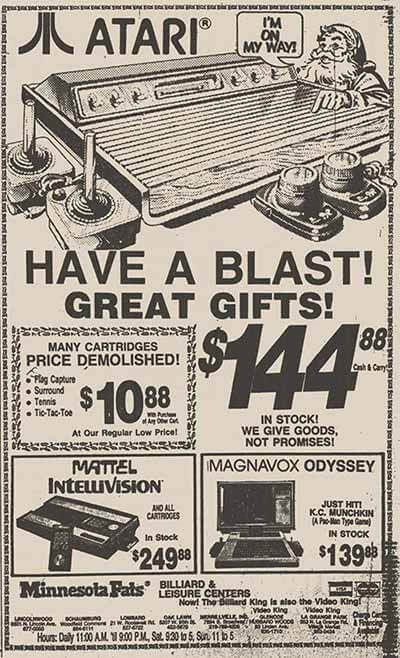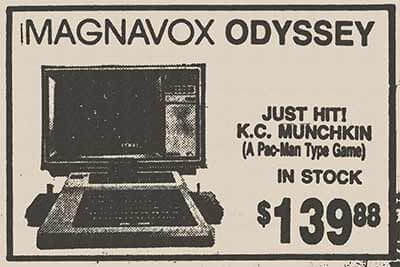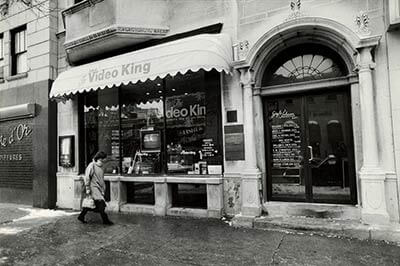The Most Important Video Game Newspaper Ad Ever?
The following advertisement ran in the Chicago Sun-Times and Chicago Tribune on November 13, 1981. (The image shown here is from the Tribune, Section 4, Page 18). Can you spot what makes it so important?

Didn't see it? Here's a closeup of the Odyssey² portion.

See those words in parentheses, just below K.C. MUNCHKIN? The words that say "A Pac-Man Type Game"? That's what makes this ad significant.
Atari, who owned the home console rights to Pac-Man in 1981, seized on those words – and other, similar words in later ads – as part of a copyright challenge. The subsequent court case and its appeal set a precedent in video game copyright law that is still cited today.
On November 13, 1981 – the same day this ad ran – Linda Pierce, a legal secretary who worked for Atari's legal firm, was instructed to purchase a copy of K.C. Munchkin. She called a Chicago store named Wieboldt's and was told by a store representative named Mr. Sarno that the game is "just like Pac-Man," but that the store did not have any copies in stock.
Two days later, an investigator for Atari's legal team named Thomas P. Gallo visited a retailer in Oak Lawn, IL. The store was Minnesota Fats, part of the same chain that ran this ad. The Minnesota Fats chain, named after the famous pool player, was a Chicago area "billiards and leisure center," a seller of billiard tables and associated merchandise. In 1980, the five Minnesota Fats stores were converted to Video King outlets and became consumer electronics stores. Apparently they were still transitioning to the new name when this ad ran ("The Billiard King is also the Video King!"). The photo below shows what a Video King store looked like in the 1980s. (This is not the specific store Mr. Gallo visited, but one presumes that store resembled this one.)

Photo by Rich Hein, Jan. 18, 1985, for Chicago Sun-Times. Click to enlarge.
Mr. Gallo entered a store like this on November 15, 1981, and purchased one of the three K.C. Munchkin carts the store had in stock. A female sales clerk told him that the game is "just like Pac-Man." Atari also noted later ads from this and other retailers that called K.C. Munchkin "as challenging as Pac-Man", "a Pac-Man game", and "Odyssey's Pac-Man".
Of course, North American Philips wasn't responsible for statements made by independent retailers or their sales clerks, but Atari claimed that they proved how people could confuse the two games. They made those claims as part of a lawsuit filed on November 18, 1981. Atari, Inc. and Midway Mfg. Co. (the U.S. licensor of arcade Pac-Man) filed suit against North American Philips and Park Television, a Magnavox Home Entertainment Center, in the United States District Court for the Northern District of Illinois Eastern Division. The suit alleged that K.C. Munchkin infringed on Pac-Man's copyright, and that the defendants engaged in deceptive trade practices by comparing the two games. It was Case number 81-C-6434.
That case was decided in Philips's favor on Dec. 4, 1981. Unfortunately for Philips, the appeal (case number 81-2920) went differently. On Mar. 2, 1982, the Court of Appeals overturned the District Court's earlier ruling and issued a preliminary injunction against North American Philips. K.C. Munchkin was found to be "substantially similar" to Pac-Man and was soon pulled from store shelves. Philips appealed to the Supreme Court, but on Oct. 4, 1982, they declined to hear the case. K.C. Munchkin became the first "banned" home console game.
The case set an important precedent in the early history of video games, establishing guidelines about what aspects of a video game were protectable under the law. The court stated that even though K.C. Munchkin was not "virtually identical" to Pac-Man, the Odyssey² game had captured the "total concept and feel" of Pac-Man and therefore infringed upon it. Although still somewhat vague, this has informed video game copyright considerations ever since.
Video King filed for Chapter 11 bankruptcy in 1985 and its 19 stores closed for good Oct. 22, 1987. Doubtless, Atari would have pursued legal action even without the claims of its sales clerks or newspaper ads, but the above ad's use in the case cemented its place in video game history. Who'd have thought four little words could make such a difference?
Note: ads used in this article were scanned from high-contrast microfilm and retouched to restore a "newspaper" look. The closeup of the Odyssey portion was edited to remove shadows and scanning artifacts introduced during the conversion to microfilm. Images were not meaningfully altered.
Sources
- Storch, Charles. "Video Chain Files for Chapter 11." Chicago Tribune: Jan.15, 1985.
- Key, Janet. "Video King Stores Shut Down." Chicago Tribune: Oct. 23, 1987.
- Atari, Inc. v. North American Philips Consumer Electronics Corp., 672 F.2d 607 (7th Cir. 1982)